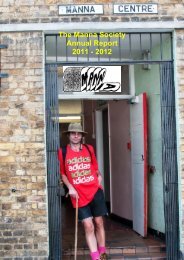The Manna Society Newsletter
The Manna Society Newsletter Christmas 2009
The Manna Society Newsletter Christmas 2009
- No tags were found...
Create successful ePaper yourself
Turn your PDF publications into a flip-book with our unique Google optimized e-Paper software.
Not to let them “drown”,<br />
the art of patience.<br />
By<br />
Milena Koczaska<br />
A10 Advice Worker<br />
What is patience? All of us can<br />
agree there is one, general<br />
definition of patience (maybe each of us would<br />
use slightly different words when describing it):<br />
“Patience is the state of endurance under<br />
difficult circumstances, which can mean<br />
persevering in the face of delay or provocation<br />
without becoming annoyed or upset; or<br />
exhibiting forbearance when under strain,<br />
especially when faced with longer-term<br />
difficulties”<br />
However, different sorts of patience exist. It is a<br />
very simple statement, but I realised it only<br />
recently. My friend who used to be my<br />
houseguest for a few days made me aware of it<br />
during one of our conversations. He is working<br />
as a nurse in a hospital, supporting seriously sick<br />
and very often older people. My main task as the<br />
A10 Nationals Advice Worker at the <strong>Manna</strong> Day<br />
Centre is to support homeless people. We both<br />
were a bit surprised when we admitted to one<br />
another that neither of us would be willing to<br />
swap our roles. He is happy to wash patients,<br />
feed them etc and I am happy to carry out my<br />
everyday duties, offering my experience and<br />
heart to homeless clients (whose problem quite<br />
often is alcohol misuse).<br />
Homeless clients often fall into trouble simply<br />
because they are living on the street (or<br />
squatting). <strong>The</strong>ir environment creates a perfect<br />
ground for problems to arise. On the other hand,<br />
alcohol makes it difficult for them to settle. <strong>The</strong><br />
result is that they are continually addressing the<br />
same issues.<br />
For example, B like every person who is without<br />
a home, job, or income and savings and who<br />
wants to survive, needs to use centres such as the<br />
<strong>Manna</strong> Centre, Dellow Centre or another centre<br />
offering meals, showers etc. It is very tempting<br />
in a city like London where you can travel on<br />
certain buses without having to show a ticket to<br />
seek a free ride. However, travelling without a<br />
valid ticket is an offence. B is a man who does<br />
not like to lie, thus each time he travels by public<br />
4<br />
transport and gets caught (without a ticket) by<br />
Ticket Inspectors, he always provides his real<br />
name and correspondence address. This means<br />
that he receives many penalty notices. To date he<br />
has received seven but this number will probably<br />
increase. B comes to see me regularly for help<br />
with these penalty notices and the resulting fines.<br />
Mr W does not like to be hungry in the evening.<br />
Day centres do not operate in the evening, so<br />
each time he is hungry, he enters shops and<br />
treats himself with bread, ham etc. This<br />
behaviour is illegal of course and sometimes he<br />
gets caught. Once caught the same procedures<br />
repeat themselves again and again: security<br />
guards, police, custody, penalties, and then<br />
letters, telephone calls, attending courts to pay<br />
fines. When we get to the end of this cycle and<br />
his fines have been paid we both are pleased and<br />
feel relieved. This particular person does not<br />
have any qualms in providing false identity<br />
details when stopped by a Ticket Inspector …<br />
Although dishonesty and stealing are wrong and<br />
should rightfully be condemned, one’s financial<br />
and social circumstances has a bearing as to how<br />
easy these principles are to live by.<br />
Z and I worked very hard to find him a job.<br />
Eventually we managed to do so. After one<br />
month Z quit the job because he did not like the<br />
atmosphere there. <strong>The</strong>re was a very bad feeling<br />
between many of the employees. Z found it very<br />
difficult to work in such an environment as he is<br />
a very friendly and sensitive person. We are now<br />
looking for another job for him once again.<br />
Despite the difficulties we had in finding him the<br />
original job, I can understand his point of view<br />
and feelings. Hopefully we can find another job<br />
with a better working environment.<br />
K lost his job and because he was unable to find<br />
another one he also lost his accommodation too.<br />
He felt that he may be eligible for benefit and so<br />
I helped him to complete and submit an online<br />
application form. K received a telephone call<br />
from a Jobcentre shortly after this and an<br />
appointment for K to attend the Jobcentre was<br />
booked. Unfortunately K has an alcohol<br />
dependency problem and finds it very difficult to<br />
stop drinking. As a result of his drinking he<br />
could not attend this appointment. A second<br />
appointment was made but once again K was<br />
unable to attend. Eventually he made the<br />
appointment at the third attempt. K admits that<br />
alcohol causes most of his problems but at this





